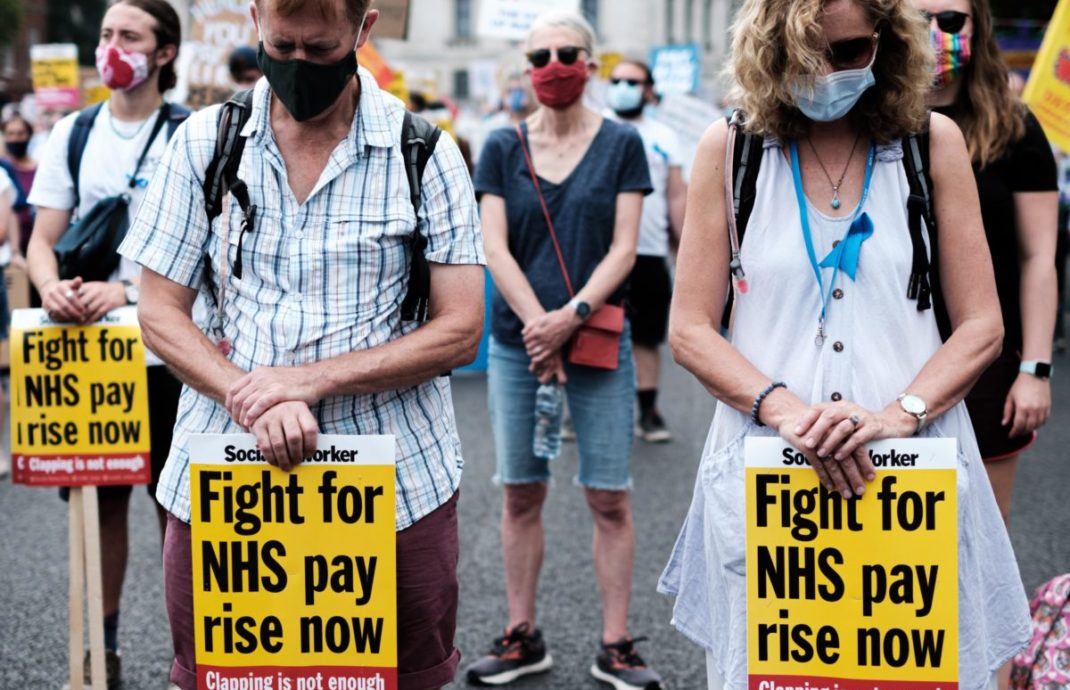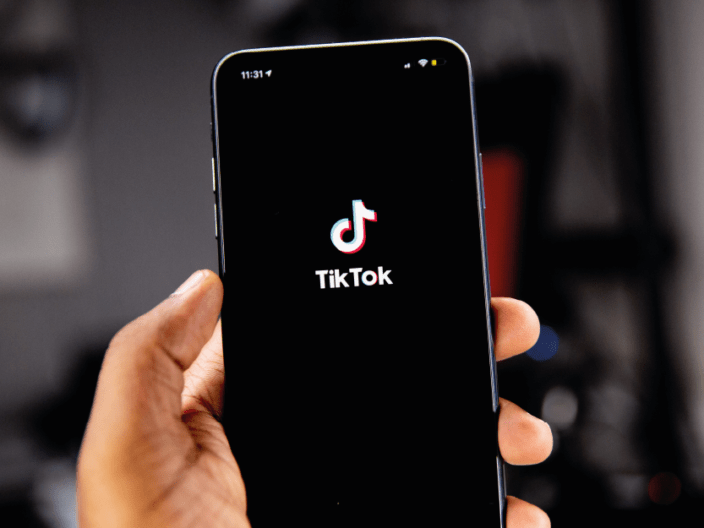The research for this article has been referenced by The Times and Nursing Times.
In the 106-year long history of the Royal College of Nursing (RCN) there has never been a bigger strike ballot than what is currently being rolled out to its 300,000 members. The RCN has stated that “strike action is a last resort. But it can be a powerful tool for change. Unfairly low pay in our profession is driving chronic understaffing. It puts patients at risk and leaves nursing staff overworked, underpaid and undervalued.” Whilst this is a surging rallying call from ‘The voice of nursing’ what do Healthcare Professionals (HCPs) on an individual level think of the radical decision to strike?
Since the beginning of 2021, over 4,500 UK HCPs have used their online social media presence to discuss the potential for industrial action by their peers. Their opinions have come together to make up over 20,000 posts in that timeframe. Unsurprisingly, conversation surrounding industrial action within the NHS has soared within recent times and with the latest news of the ballot rollout, HCPs were online within minutes to share their thoughts and opinions online.
As can be seen in the chart below there are two striking components to the HCP conversation surrounding this topic; one is the surge in NHS industrial action discussion in October and November 2022 – with over 12,000 HCP mentions online of industrial action within the NHS. Secondly, the HCPs driving the conversation surrounding NHS strikes were nurses. Since the beginning of 2021, nurses have made up to 40% of the online NHS industrial action conversation.
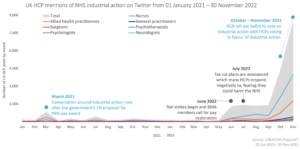
Nurses have support from their HCP peers
However, whilst the conversation may have been driven by nurses, they have not been unaccompanied in their journey towards NHS industrial action discussion. Many HCPs in other roles have echoed the sentiments of nurses and chosen to stand alongside them and junior doctors in their fight for fair pay and better treatment. Many HCPs have commented that this move to industrial action is not just for nurses or junior doctors, but that as a workforce, ‘patient facing HCPs’ must band together to ensure their voice is heard and they present a united front.
When newly qualified doctors are earning what is being proposed as a minimum living wage its clear that something has to change. If striking is what it takes, crack on. We’ll keep you safe & support you 100%! https://t.co/EwelqEbNoD
— Steve Gill 💙 🇺🇦 (@ICMdoc) October 1, 2022
The issue of patient safety in NHS strikes
Within the NHS strike conversation a common theme that emerged is the issue of patient safety; many HCPs pressing for strike action have cited the dangers to patient safety with the National Health Service that is in serious decline, plagued by extensive and deep-seated issues and facing immense pressures from the pandemic and Brexit. Numerous HCPs shared the belief that patient safety is currently at serious risk of falling below acceptable standards as more and more HCPs threaten to walk from the profession, and state they believe there is an inability to recruit at large because of current pay standards. This means that many in the NHS have a tough decision to make regarding whether or not to take action in the form of striking, with one-side of the argument being that a strike must happen as “nurses have the right to strike & we have a moral obligation to when safety is at risk”.
I don’t think I’ve ever heard this much support for strike action from doctors across the board; all grades. However, it’s not just about pay. These NHS staff want to force the government to fund the service better to keep both patients and staff safe.
— Dr Julia Grace Patterson💙 (@JujuliaGrace) July 21, 2022
Whereas, on the other side of the patient safety debate lies HCPs who have a different perspective, sharing their opinion that industrial action will ultimately put more patients at risk with a lack of staff to care for them and striking would undoubtedly put them into a difficult moral quandary. Moreover, this is one of the reasons why some members of the public have not shown as much support for the news as others, whilst some believed the UK has coped without most NHS services for a year and could continue to do so. Nevertheless, other HCP roles – such as doctors and surgeons – have come alongside nurses to encourage them to strike and alter their own duties to ensure patient safety is maintained.
My sickest patients are often dependent on 2-3 forms of organ support and there's a shortage of nurses trained to handle patients that sick. I'm not convinced that I could square striking with my conscience.
— Sarah 💫 (@mstrisarahtops) March 5, 2021
It would seem patient safety will be at the heart of the decision making process for many HCPs who are facing the decision of industrial action. However, from analysing the original posts of UK HCPs citing patient safety alongside industrial action the majority support striking as the dwindling numbers of HCPs in the NHS is seen as a greater threat to patient safety than striking itself.

Timeline of NHS industrial action conversation
Whilst a conversation regarding industrial action may well have been welcomed by HCPs at any point in the last 22 months, the online discussion was not linear and different events across this time period spurred conversations.
June 2022: NHS following in the footsteps of the rail strikes
At the beginning of June 2022, online HCP conversation surrounding strikes within the NHS increased by over 1,000 mentions from the previous months, this was largely inspired by the industrial action of rail workers who on the 7th June 2022 announced their strike dates. A great deal of HCPs voiced their support for the rail strikes and could surely empathise with the decision. Moreover, upon seeing the news that rail workers had taken the decision to invoke a strike some HCPs were inspired to start the conversation in relation to their own work. During this month, multiple HCPs from across a range of HCP roles called for action to be taken for nurses and care workers, whilst also sharing the stark contrast in pay increases between MPs and healthcare workers in the last 20 years, commenting that “MPs pay has risen £20,000”.
October 2022: RCN ballot rollout amidst HCPs in living crisis
As previously stated, the rise in UK HCP mentions of NHS industrial action during October was colossal. Armed with the news of the RCN ballot rollout, scores of HCPs referenced not the desire or want to strike but the need to. Reasons such as nurses using food banks and the biggest nursing shortage the NHS has ever seen were referenced as reasons for the strikes to take place. Multitudes of HCPs shared alarming figures from campaigns which demonstrated the plight in which many HCPs find themselves in, compounded even more by the cost of living crisis. Furthermore, the public support that has been evidenced throughout the summer for NHS workers to take industrial action has encouraged many that the time is right for industrial action.
Why have nurses have resorted to voting for industrial action?
Nurses are using food banks. Unable to make ends meet. Biggest nursing shortage NHS has ever seen.
Things need to change
We are doing this for patients. It’s the only tool we have left https://t.co/Nm9xXBn6sv— Ana Waddington (She/Her) (@alwaddington) October 7, 2022
In fact following the recent changes in the conversation, there is now more support than ever for industrial action from within the HCP community. Looking into the online conversation from 01 November to 01 December 2022 alone, over 2,500 individual HCPs posted about industrial action, with almost 85% of these supporting their peers wishing to strike. Whereas only 5% of HCPs spoke against industrial action in this timeframe.

Barriers to productivity for HCPs
Alongside the conversation for industrial action to materialise, UK HCPs have also referenced certain barriers to productivity that they are experiencing at large in their current roles. Whilst the current pay structure has been adduced to explain many of the grievances NHS workers have with their job, this concern can escalate into a multitude of problems, and is now being seen as only one facet which is causing difficulties for many in their work.
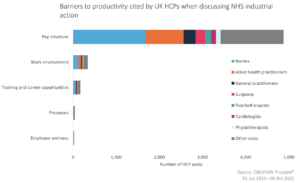
NHS pay structure is tip of the aggrieved iceberg
One such problem that exists as a result of poor pay structure is the high number of staff vacancies, which leads to current staff being overworked and burned out. Moreover, some NHS workers mentioned that an abusive culture existed within the organisation that made work very difficult. What was more alarming was that these sentiments were part of a growing trend where NHS workers were experiencing a toxic work environment. This was also evidenced in stories that upon receiving the news of the RCN ballot, HCPs shared that they had heard nurses being threatened with disciplinary action if they vote for industrial action.
Online conversations surrounding NHS workers’ wellbeing have been taking place for some time now, indeed in an article for CREATION.co, Mary Kangley wrote of the impact the COVID-19 pandemic was having on HCPs’ wellbeing and the need for suitable support for workers on the frontline.
Patients lives are at risk every single day due to staff shortage which will only get worse due to the amount of nurses leaving the profession due to pay, staff shortages, abuse, the list is endless
— Taylor (@tayjosborne) October 8, 2022
As the general conversation regarding industrial action has grown, the support for industrial action amongst UK HCPs has also grown alongside the conversation. In fact from September 2021 to September 2022 support for industrial action grew from 59% to 85% amongst UK HCPs discussing industrial action.
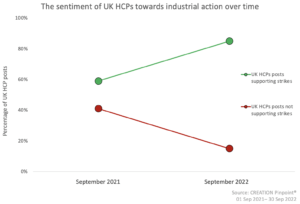
What is next for NHS workers and industrial action?
During the COVID-19 pandemic, people lined the streets to applaud the efforts of NHS workers. However, for many of the people being applauded there was an underlying feeling that this applause would slowly die out and not be replaced by a genuine token of appreciation. Only two years later many feel their hand has been forced and that they have had no other alternative but to strike, this begs the question what is next for these NHS workers if they were to take industrial action and what would that impact be on the country?
If you want to discover HCP views and perceptions of new data, medical education or any health related topic, get in touch, we’d love to chat.
 By Mark Sullivan
By Mark Sullivan 